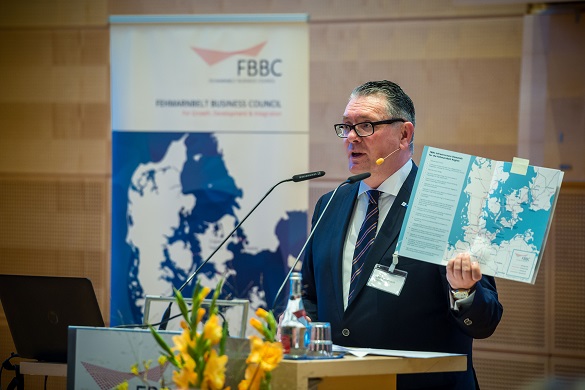
The Fehmarnbelt Business Council welcomes yesterday’s decision by the European Commission to fund the Fehmarnbelt project with 123.5 million Euro for construction works on the Danish railway connection from Ringsted, Southwest of Copenhagen, in the direction of the Fehmarnbelt Tunnel.
FBBC Chairman Siegbert Eisenach commented: “This decision underlines the truly European idea of the whole Fehmarnbelt project. It will help to bring Europe closer together and remove a huge barrier for the exchange of persons and goods. The tunnel will effectively reduce transport time not just between the metropolitan areas of Copenhagen and Hamburg, but also the wider Fehmarnbelt region. It will connect Scandinavia and Central Europe.”
Michael Svane, Vice Chairman of the FBBC, added: “We are of course glad to see that the Fehmarnbelt project receives such strong support from the European level. The Fehmarnbelt Tunnel and the investments in the railway connections on the Danish and German side of the Tunnel are game-changers for the whole region. Especially railway will become more attractive, thus helping reduce green-house gas emissions. The project will help make transport in our region greener and also improve conditions for commuters.”
Whereas the Fehmarnbelt Tunnel in itself is vitally important, it cannot stand alone, Eisenach reassured:
“We have to improve the infrastructure in the wider Fehmarnbelt Region to fully exploit the potential of the Fehmarnbelt Tunnel. The public authorities in Germany, Denmark and Sweden have to prioritize the hinterland infrastructure as well as the fixed link itself. We will continue to follow the ongoing and planned projects closely and make the voice of business in the Fehmarnbelt Region heard.”
Michael Svane underlined the importance of infrastructure within the wider Fehmarnbelt Region: “On both sides of the Fehmarnbelt, we are inspired by the vision of a Northern European growth region. The construction works for the Danish railway connection that are already in full swing are just the beginning of making this vision become reality.” Svane referred to the Fehmarnbelt Tunnel that is expected to be started in 2020, and the advanced stage of planning for the German railway connection from Puttgarden to Lübeck, and beyond. He emphasized the importance of binding the metropolitan areas and growth centres together by an effective transport infrastructure.
The Fehmarnbelt project, which was identified as one of the Commission’s flagship projects that will help remove the bottleneck in the Scandinavian-Mediterranean Corridor, is one of 39 projects that receive a total of 1 billion Euro in funding through the Connecting Europe Facility (CEF). The proposal by the European Commission is now presented to the EU Member States that will formally approve the proposed funding decision at their meeting on 12 December 2017 An adoption of the formal decision by the Commission will follow.
Information on the current status of the project
Works on the 120 km long Danish railway project that received 123.5 million Euro in European funding are in full swing. The line from Ringsted to the Fehmarnbelt Tunnel will be upgraded, an additional track is built on 55 km and the line will be electrified. Construction of the Fehmarnbelt Tunnel itself is expected to start in 2020 and to be concluded in 2028. The planning process for the 88 km long German railway connection from Puttgarden to Lübeck – electrified and upgraded to dual-track – is not concluded yet, also due to significant changes to the originally planned layout of the line. Deutsche Bahn will shortly start handing in documents to the responsible authority (Eisenbahnbundesamt) in the approval process. Construction of the Danish railway connection between Copenhagen and Ringsted (60 km, dual-track, electrified) is already concluded and the line will be operational in 2018.
